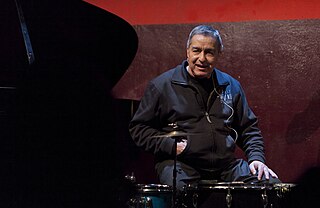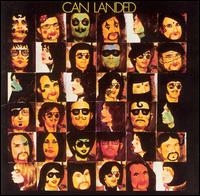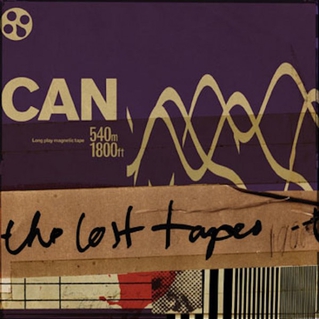
Can was a German experimental rock band formed in Cologne in 1968 by the core quartet of Holger Czukay, Irmin Schmidt (keyboards), Michael Karoli (guitar), and Jaki Liebezeit (drums). The group cycled through several vocalists, most prominently the American-born Malcolm Mooney (1968–70) and the Japanese-born Damo Suzuki (1970–73), as well as various temporary members.
Krautrock is a broad genre of experimental rock that developed in West Germany in the late 1960s and early 1970s among artists who blended elements of psychedelic rock, electronic music, and avant-garde composition. These artists moved away from the blues influences and song structure found in traditional Anglo-American rock music, instead utilizing hypnotic rhythms, tape-music techniques, and early synthesizers. Prominent groups associated with krautrock music included Can, Neu!, Amon Düül II, Faust, Popol Vuh, Cluster, Ash Ra Tempel, Agitation Free, Guru Guru, Tangerine Dream, Kraftwerk, and Harmonia.

Holger Czukay was a German musician, probably best known as a co-founder of the krautrock group Can. Described as "successfully bridg[ing] the gap between pop and the avant-garde", Czukay was also notable for having created early important examples of ambient music, for having explored "world music" well before the term was coined, and for having been a pioneer of sampling.
Irmin Schmidt is a German keyboardist and composer, best known as a founding member of the band Can.

Jaki Liebezeit was a German drummer, best known as a founding member of experimental rock band Can. He was called "one of the few drummers to convincingly meld the funky and the cerebral".
Michael Karoli was a German guitarist, violinist and composer. He was a founding member of the influential krautrock band Can.

Malcolm Mooney is an American singer, poet, and artist, best known as the original vocalist for German krautrock band Can.

Monster Movie is the debut studio album by German rock band Can, released in August 1969 by Music Factory and Liberty Records.

Tago Mago is the second album by the German krautrock band Can, originally released as a double LP in 1971. It was the band's second studio album and the first to feature Damo Suzuki after the 1970 departure of previous vocalist Malcolm Mooney. Recorded in a rented castle near Cologne, the album features long-form experimental tracks blending funk rhythms, avant-garde noise, jazz improvisation, and electronic tape editing techniques.

Ege Bamyası is the third studio album by German krautrock band Can, originally released as an LP in 1972 by United Artists. The album contains the single "Spoon", which charted in the Top 10 in Germany, largely because of its use as the theme of a German TV thriller mini-series called Das Messer. The success of the single allowed Can to move to a better studio, in which they recorded Ege Bamyası.

Soundtracks is a compilation album by the Krautrock group Can. It was first released in 1970 and consists of tracks written for various films. The album marks the departure of the band's original vocalist Malcolm Mooney, who sings on two tracks, to be replaced by new member Damo Suzuki. Stylistically, the record also documents the transition from the psychedelia-inspired jams of their earliest recordings to the more meditative, electronic, and experimental mode of the studio albums that followed.

Soon Over Babaluma is the fifth studio album by the rock music group Can. This is the band's first album without a lead vocalist who does not play an instrument, following the departure of Damo Suzuki in 1973 during which he married his German girlfriend. The vocals are provided by guitarist Michael Karoli and keyboardist Irmin Schmidt. It is also their last album that was created using a two-track tape recorder.

Landed is the band Can's sixth studio album, released in 1975.

Flow Motion is the seventh Can studio album, and features the UK hit single "I Want More".

Delay 1968, or just Delay, is a compilation album of mostly previously unissued early recordings by German experimental rock band Can during its work with singer Malcolm Mooney, including some of the band's earliest material. The song "Thief" had previously been released officially on the United Artists compilation album Electric Rock in 1970; it was later covered live by Radiohead.

Can Live Music is a double live album by the band Can, released in 1999 and recorded in the UK and West Germany between 1972 and 1977. It originally came as an item in the now out of print Can box set.

The Peel Sessions is a compilation album by the German experimental rock band Can. Released in November 1995, it contains songs from four sessions recorded for John Peel's Radio 1 show. The sessions took place in February 1973, January 1974, October 1974, and May 1975. The songs are mostly unreleased improvisations. "Geheim" is released as "Half Past One" on Landed and "Mighty Girl" as "November" on Out of Reach.

The Lost Tapes is a compilation album of studio outtakes and live recordings by the German experimental rock band Can, which was originally released as an LP in 2012 by Spoon Records in conjunction with Mute Records. The compilation was curated by Irmin Schmidt and Daniel Miller, compiled by Irmin Schmidt and Jono Podmore, and edited by Jono Podmore.
René Tinner is a Swiss recording engineer and producer, who has produced over 200 studio records and numerous live performances.

Romantic Warriors IV: Krautrock (2019) is the fourth in a series of feature-length documentaries about progressive music written and directed by Adele Schmidt and José Zegarra Holder. RW4 focuses on the progressive rock music from Germany popularly known as Krautrock, although the integration of Krautrock into the progressive rock genre is a purely American notion. In Europe, the conventional wisdom is that Krautrock can be considered at most as the connection between psychedelic rock and progressive rock. The term "Krautrock" was applied after-the-fact by British journalists, and in fact the German bands share very few similarities.
















